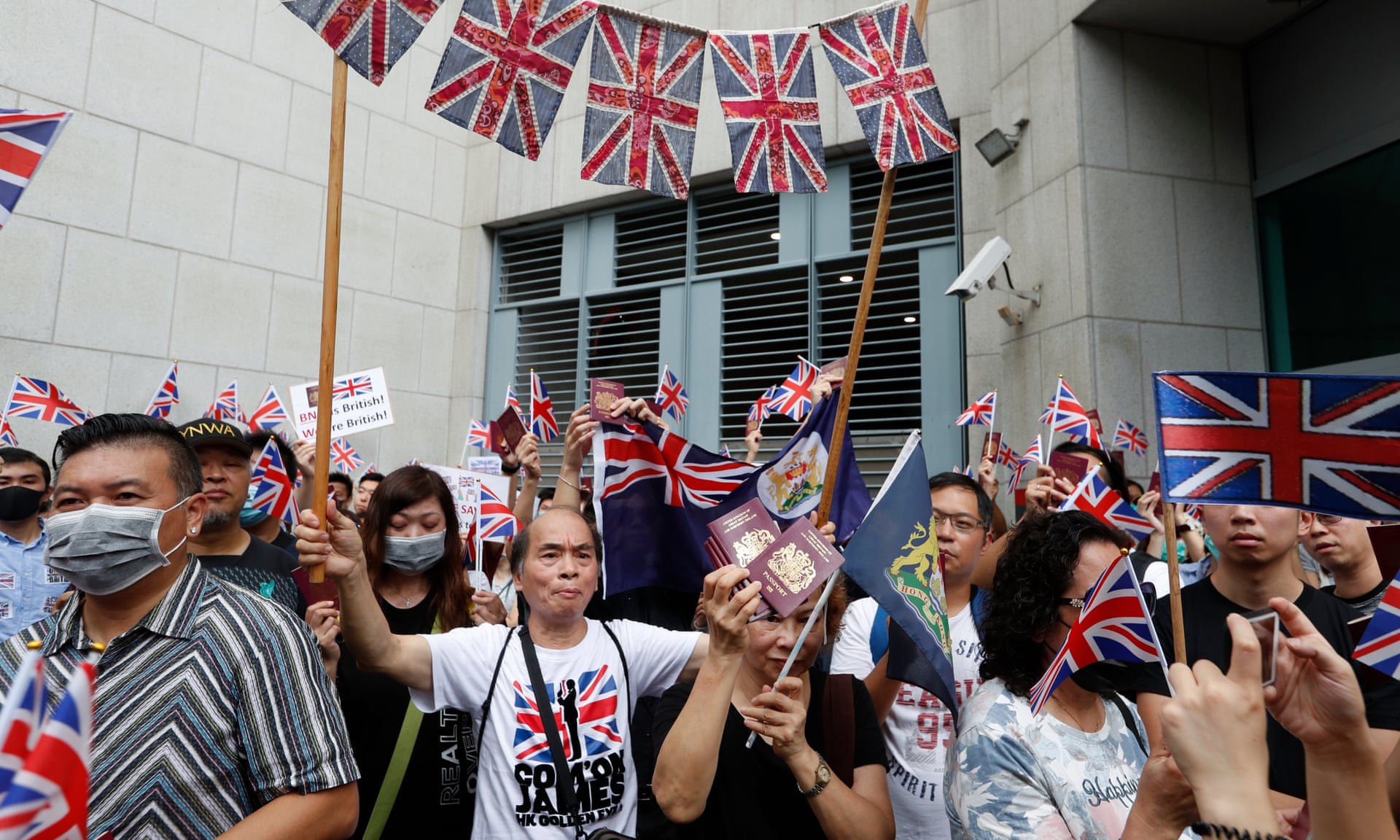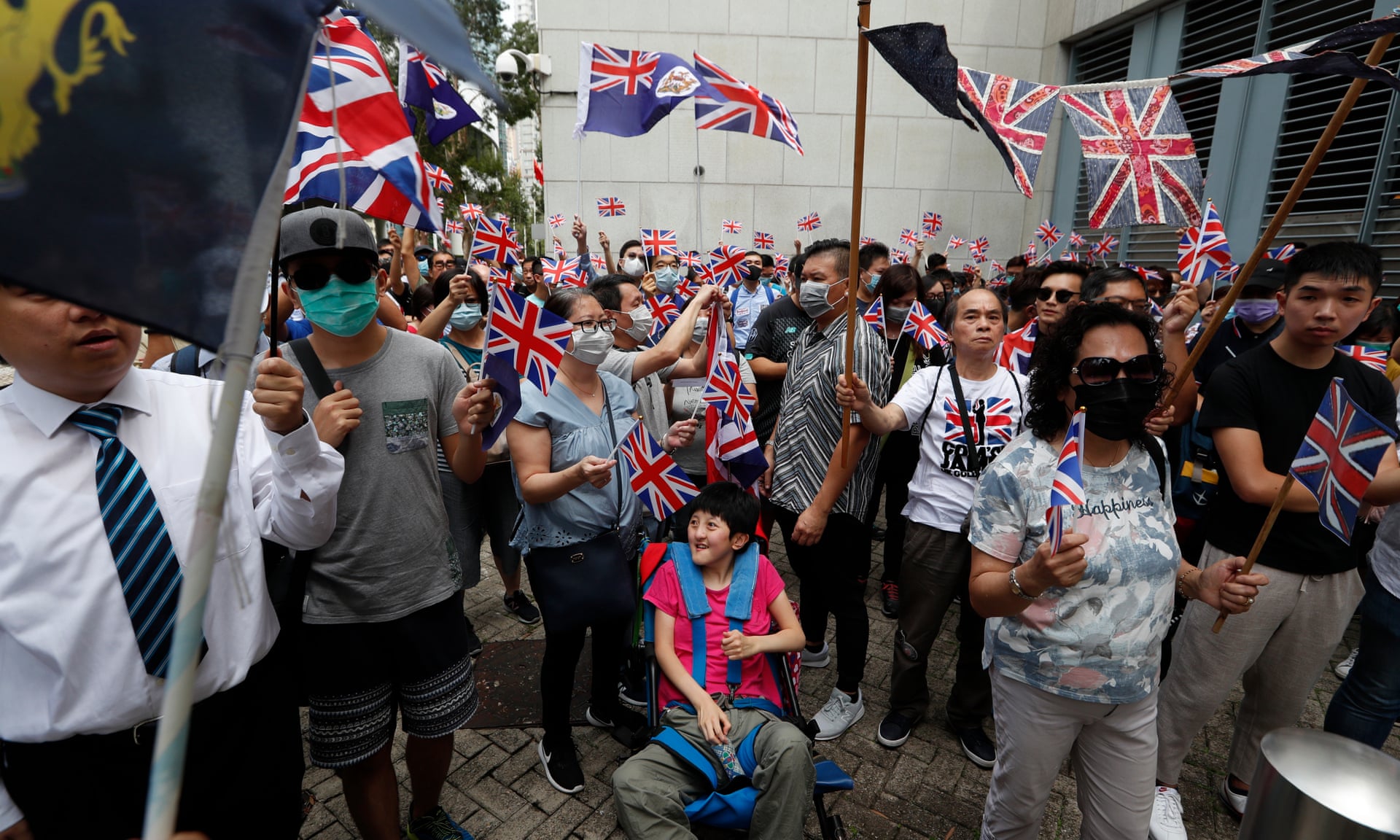Campaigners say it is time to extend the right of abode previously denied to British National (Overseas) passport holders
By Tania Branigan
Anti-government protesters in Hong Kong call on the British government to declare the Sino-British Joint Declaration of 1997 invalid.
Calls for the UK to restore the right of abode to people in Hong Kong are growing as the political crisis in the former British colony escalates.
As fears of direct intervention by Beijing grow, veteran pro-democracy campaigners have argued that Britain has a responsibility to protect residents who hold the passports it issued ahead of the handover.
Several hundred protesters rallied outside the British consulate on Sunday to demand they receive a full British passport, the Financial Times reported.
In the run-up to Hong Kong’s handover in 1997, Britain replaced the British Dependent Territories Citizens passports held by three million people with the British National (Overseas) passport, which grants the right to vote in the UK, but not the right to live or work here.
A passionate campaign for holders to be granted the right of abode, particularly in light of 1989’s brutal crackdown on Tiananmen Square’s pro-reform protests, was dismissed – earning the BN(O) the nickname “Britain says No”.
Craig Choy, a lawyer who has helped to lead the campaign for equal rights for BN(O) holders has compared the treatment of people in Hong Kong to the Windrush scandal.
The passports are available only to those who registered before 1997, and holders are not able to pass their status to their children, but the documents can be renewed at any time.
The passports are available only to those who registered before 1997, and holders are not able to pass their status to their children, but the documents can be renewed at any time.
The number of valid passports at the moment is thought to be in the tens of thousands, but renewals appear to have risen sharply in years when political tensions have run high.
Anson Chan, formerly the second highest official in the city, said the UK should consider the issue again: “You promised Hong Kong a high degree of autonomy and basic rights and freedoms – when those are taken away from them, surely Britain has a legal and moral responsibility to deal with the consequences.”
Martin Lee, the veteran Hong Kong campaigner nicknamed its “father of democracy”, said it was all the more pressing to revisit the right of abode and related issues in light of the protest movement and the fact that the “one country, two systems” arrangement which underpins the Sino-British joint declaration was no longer working.
“That’s the obligation of the British government, being the only other signatory to the joint declaration,” he said.
Last month Tom Tugendhat, chair of the Commons foreign affairs committee, said that Britain should grant Hong Kong citizens with BN(O) passports full UK nationality.
Anson Chan, formerly the second highest official in the city, said the UK should consider the issue again: “You promised Hong Kong a high degree of autonomy and basic rights and freedoms – when those are taken away from them, surely Britain has a legal and moral responsibility to deal with the consequences.”
Martin Lee, the veteran Hong Kong campaigner nicknamed its “father of democracy”, said it was all the more pressing to revisit the right of abode and related issues in light of the protest movement and the fact that the “one country, two systems” arrangement which underpins the Sino-British joint declaration was no longer working.
“That’s the obligation of the British government, being the only other signatory to the joint declaration,” he said.
Last month Tom Tugendhat, chair of the Commons foreign affairs committee, said that Britain should grant Hong Kong citizens with BN(O) passports full UK nationality.
He told the FT that “a few” cabinet ministers were supportive of the decision.
People gather to call on the British government to declare the invalidity of the Sino-British Joint Declaration on Sunday.
Chris Patten, the last governor of Hong Kong before the handover, unsuccessfully urged the UK to give the right of abode to all those holding British Dependent Territories passports.
The late Lord Ashdown, who as Liberal Democrat leader campaigned on the issue, said last year that Britain was “urgently in need of some soul-searching enquiry about our neglect of duty towards our former colonial subjects” which should include considering the rights of BN(O) in Hong Kong.
A government spokesperson said: “We continue to believe that the best solution for Hong Kong, and the British National (Overseas) passport holders that live there, is full respect for the rights and freedoms guaranteed in the Sino-British Joint Declaration.”
Last year, declassified files revealed that Britain even pressured Portugal repeatedly not to grant rights to citizens of Macau before it handed the region back to China, fearing that it would increase the pressure to grant Hong Kong similar rights.
Lisbon granted passports, with full citizenship rights, to anyone born before late 1981 and allowed Portuguese nationality to be passed to their children.
One protester told the Guardian she was planning to renew her BN(O) passport in case of a crackdown by Beijing, even though she did not want to leave her home.
She added: “I don’t expect Britain to give me residency, but it might help me to get somewhere else.”

Aucun commentaire:
Enregistrer un commentaire